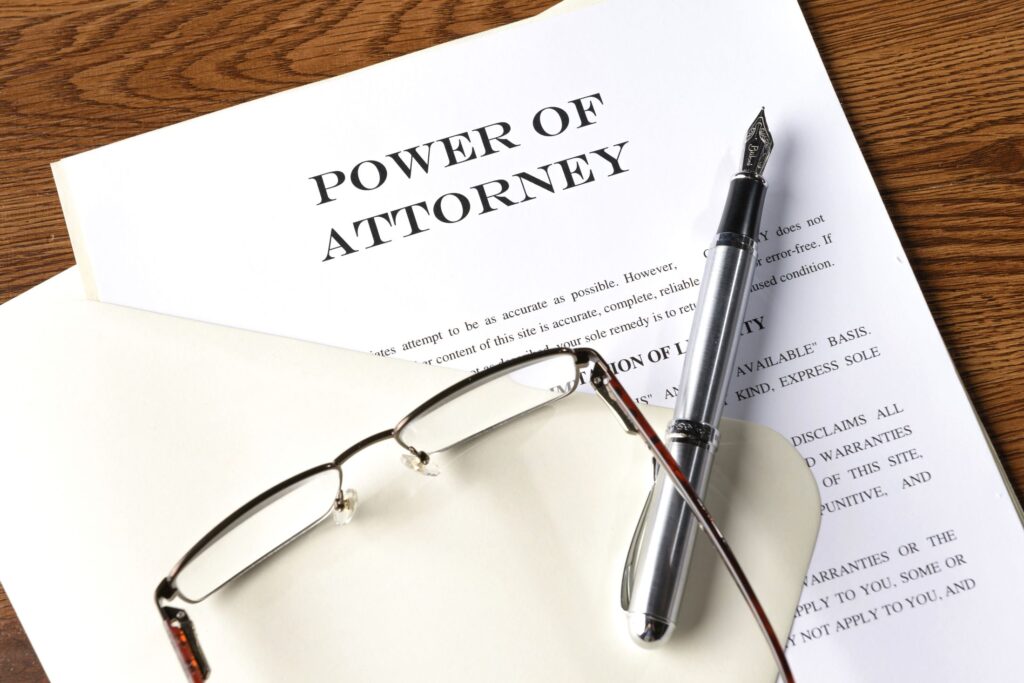A Power of Attorney (POA) is a legal document that grants someone the authority to act on your behalf in various financial, legal, and medical matters. This legal instrument plays a pivotal role in ensuring that your interests are protected and your affairs are managed smoothly, especially in situations where you may be unable to make decisions yourself. Keep reading to learn more about what a Power of Attorney is, the different types of POAs, and why having one is a crucial aspect of comprehensive estate planning.

What is a Power of Attorney?
A Power of Attorney is a legally binding document that authorizes an individual, known as the “agent” or “attorney-in-fact,” to make decisions and take actions on behalf of another person, referred to as the “principal.” The principal grants specific powers to the agent, allowing them to act in their stead under certain circumstances or for specific purposes.
Types of Powers of Attorney
There are several types of Powers of Attorney, each serving a distinct purpose. Here are the most common ones:
- General Power of Attorney (GPOA): A GPOA grants broad authority to the agent to manage various financial and legal matters, including signing contracts, managing investments, and handling tax matters. It’s often used for convenience and in situations where the principal is fully competent.
- Limited or Special Power of Attorney: This type of POA restricts the agent’s authority to specific actions or for a limited duration. For example, you might grant someone a limited POA to sell a property on your behalf while you’re abroad.
- Durable Power of Attorney: A durable POA remains effective even if the principal becomes incapacitated or mentally incompetent. This type of POA is crucial for managing the affairs of someone who may become unable to make decisions independently due to illness or injury.
- Medical or Healthcare Power of Attorney: This type of POA, also known as a healthcare proxy, empowers an agent to make medical decisions on the principal’s behalf if they are unable to do so. It ensures that the principal’s healthcare wishes are honored.
- Springing Power of Attorney: A springing POA only becomes effective under specific circumstances, typically when the principal becomes incapacitated. It’s a protective measure that allows someone to step in and make decisions when needed.
Why Do You Need a Power of Attorney?
- Incapacity Planning: A Power of Attorney ensures that someone you trust can manage your affairs if you become incapacitated. Without one, the court may need to appoint a guardian, which can be a costly and time-consuming process.
- Financial Management: A POA is invaluable for handling financial matters, such as paying bills, managing investments, and filing taxes, especially if you travel frequently or face physical limitations.
- Healthcare Decisions: A medical POA allows you to designate someone to make healthcare decisions for you if you’re unable to do so. This ensures that your preferences are respected, even in critical medical situations.
- Peace of Mind: Knowing that you have a trusted individual looking out for your best interests can provide peace of mind. It’s an essential component of comprehensive estate planning that protects your assets and your well-being.
Ready to Create One?
A Power of Attorney is a versatile and essential legal tool that empowers someone you trust to make important decisions on your behalf when you cannot. It’s a fundamental aspect of responsible estate planning that ensures your financial, legal, and healthcare affairs are managed according to your wishes, even in challenging circumstances. If you’re ready to create a Power of Attorney that suits your specific needs, DK Rus Law is here to help. We guide you through the process and help you make informed decisions about granting authority to someone you trust.
Contact us now to get started.

